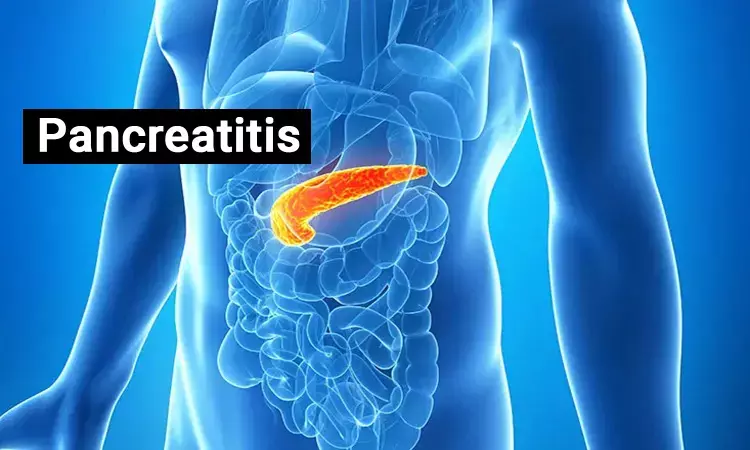- Home
- Medical news & Guidelines
- Anesthesiology
- Cardiology and CTVS
- Critical Care
- Dentistry
- Dermatology
- Diabetes and Endocrinology
- ENT
- Gastroenterology
- Medicine
- Nephrology
- Neurology
- Obstretics-Gynaecology
- Oncology
- Ophthalmology
- Orthopaedics
- Pediatrics-Neonatology
- Psychiatry
- Pulmonology
- Radiology
- Surgery
- Urology
- Laboratory Medicine
- Diet
- Nursing
- Paramedical
- Physiotherapy
- Health news
- Fact Check
- Bone Health Fact Check
- Brain Health Fact Check
- Cancer Related Fact Check
- Child Care Fact Check
- Dental and oral health fact check
- Diabetes and metabolic health fact check
- Diet and Nutrition Fact Check
- Eye and ENT Care Fact Check
- Fitness fact check
- Gut health fact check
- Heart health fact check
- Kidney health fact check
- Medical education fact check
- Men's health fact check
- Respiratory fact check
- Skin and hair care fact check
- Vaccine and Immunization fact check
- Women's health fact check
- AYUSH
- State News
- Andaman and Nicobar Islands
- Andhra Pradesh
- Arunachal Pradesh
- Assam
- Bihar
- Chandigarh
- Chattisgarh
- Dadra and Nagar Haveli
- Daman and Diu
- Delhi
- Goa
- Gujarat
- Haryana
- Himachal Pradesh
- Jammu & Kashmir
- Jharkhand
- Karnataka
- Kerala
- Ladakh
- Lakshadweep
- Madhya Pradesh
- Maharashtra
- Manipur
- Meghalaya
- Mizoram
- Nagaland
- Odisha
- Puducherry
- Punjab
- Rajasthan
- Sikkim
- Tamil Nadu
- Telangana
- Tripura
- Uttar Pradesh
- Uttrakhand
- West Bengal
- Medical Education
- Industry
Optimal timing of cholecystectomy after necrotising biliary pancreatitis crucial: Study

Following an episode of acute biliary pancreatitis, cholecystectomy is advised to prevent recurrent biliary events.
There is limited evidence regarding the optimal timing and safety of cholecystectomy in patients with necrotising biliary pancreatitis. The optimal timing of cholecystectomy after necrotising biliary pancreatitis, in the absence of peripancreatic collections, is within 8 weeks after discharge, suggests a study conducted by Nora D Hallensleben and colleagues from the Department of Gastroenterology, Erasmus Medical Center, Rotterdam, The Netherlands.
The study is published in The Gut Journal.
A post hoc analysis of a multicentre prospective cohort was carried out. Patients with biliary pancreatitis and a CT severity score of three or more were included in the trial.
Primary outcome was the optimal timing of cholecystectomy in patients with necrotising biliary pancreatitis which was defined as the optimal point in time with the lowest risk of recurrent biliary events and the lowest risk of complications of cholecystectomy.
While, the secondary outcomes were the number of recurrent biliary events, periprocedural complications of cholecystectomy and the protective value of endoscopic sphincterotomy for the recurrence of biliary events.
Overall, 248 patients were included in the analysis. Cholecystectomy was performed in 191 patients (77%) at a median of 103 days (P25–P75: 46–222) after discharge.
The following findings were established –
- Infected necrosis after cholecystectomy occurred in four (2%) patients with persistent peripancreatic collections.
- Before cholecystectomy, 66 patients (27%) developed biliary events.
- The risk of overall recurrent biliary events prior to cholecystectomy was significantly lower before 10 weeks after discharge (risk ratio 0.49 (95% CI 0.27 to 0.90); p=0.02).
- The risk of recurrent pancreatitis before cholecystectomy was significantly lower before 8 weeks after discharge (risk ratio 0.14 (95% CI 0.02 to 1.0); p=0.02).
- The complication rate of cholecystectomy did not decrease over time.
- Endoscopic sphincterotomy did not reduce the risk of recurrent biliary events.
Hence, the optimal timing of cholecystectomy after necrotising biliary pancreatitis, in the absence of peripancreatic collections, is within 8 weeks after discharge, the authors concluded.
http://dx.doi.org/10.1136/gutjnl-2021-324239
Dr. Nandita Mohan is a practicing pediatric dentist with more than 5 years of clinical work experience. Along with this, she is equally interested in keeping herself up to date about the latest developments in the field of medicine and dentistry which is the driving force for her to be in association with Medical Dialogues. She also has her name attached with many publications; both national and international. She has pursued her BDS from Rajiv Gandhi University of Health Sciences, Bangalore and later went to enter her dream specialty (MDS) in the Department of Pedodontics and Preventive Dentistry from Pt. B.D. Sharma University of Health Sciences. Through all the years of experience, her core interest in learning something new has never stopped. She can be contacted at editorial@medicaldialogues.in. Contact no. 011-43720751
Dr Kamal Kant Kohli-MBBS, DTCD- a chest specialist with more than 30 years of practice and a flair for writing clinical articles, Dr Kamal Kant Kohli joined Medical Dialogues as a Chief Editor of Medical News. Besides writing articles, as an editor, he proofreads and verifies all the medical content published on Medical Dialogues including those coming from journals, studies,medical conferences,guidelines etc. Email: drkohli@medicaldialogues.in. Contact no. 011-43720751


